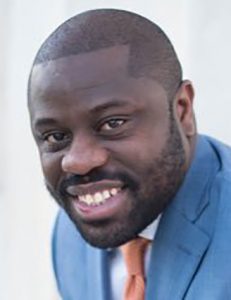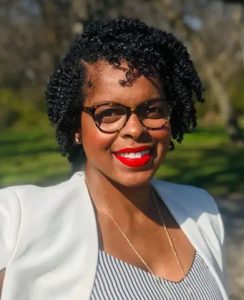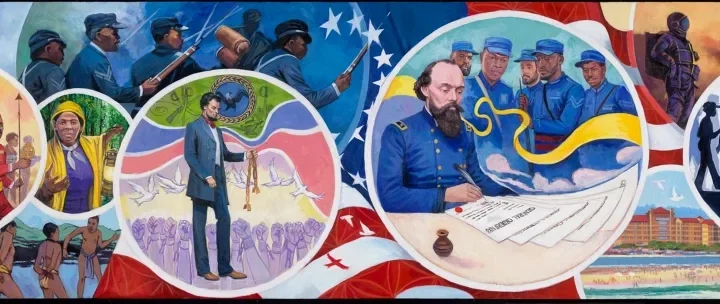Juneteenth observances must go beyond celebrating the emancipation of enslaved people to calling out modern forms of white supremacy that continue to oppress people of color, speakers said during a June 19 online vigil hosted by the Alliance of Baptists.
Juneteenth, which became a U.S. holiday in 2021, marks the day in 1865 when enslaved Americans in Galveston, Texas, were informed they were free — two years after President Abraham Lincoln signed the Emancipation Proclamation.
But even then, the suffering did not stop for the emancipated and their descendants, Alliance Co-Director Elijah Zehyoue said.

Elijah Zehyoue
“Despite this day celebrating the legal abolition of slavery, slavery continued as a norm and practice well after June 19, 1865. It continued as Black people were terrorized and lynched and were forced to continue to labor on plantations, and through Jim Crow discrimination, segregation laws and punitive criminal statutes against Black people,” he added. “And in many ways it continues even today through our criminal legal system, which overwhelmingly incarcerates and surveils and criminalizes Black people.”
Juneteenth also evokes a somber tone by recalling that chattel slavery lasted 400 years and involved 12.5 million captured Africans forced into bondage in the U.S. and other nations. It’s why the Alliance decided to hold its holiday observance as a “vigil,” Zehyoue said.
“We gather here today not just for celebration, but also for vigil and to hold space to remember all those who died before they were free, all those who struggled for freedom, all those who continue to struggle for freedom,” he said. “And we gather on Juneteenth knowing it is a global call to action. A call to renewal. It is a reminder that the struggle for freedom and liberation continues. It is a call to continue to do the work for freedom here and everywhere.”

Aretha Flucker
Featured speaker Aretha Flucker connected the theme of vigil to the process of grief that comes with mourning the victims of slavery and other forms of racial injustice.
“So, today at this vigil we lament. We express our frustration and anger and sadness over this atrocity. We remember our enslaved ancestors, and we hold a symbolic watch in remembrance of them and their journey to freedom,” said Flucker, director of community and spiritual life at Brite Divinity School at Texas Christian University.
But she also issued a challenge to imagine God holding vigil to observe God’s people’s response — or lack of response — to injustice. “Why would God have the need to watch us? Why would God hold a vigil?”
God is watching this Juneteenth as racial, economic and judicial injustices flourish.
In part, the answer can be found in the past, Flucker said, asserting God held vigils when the children of Israel escaped bondage in Egypt and again in 1865 when Black people enslaved in the South learned of their freedom. And God is watching this Juneteenth as racial, economic and judicial injustices flourish.
God holds such vigils in the hope that God’s people will transform into agents of justice, she said. “God has faith that even more judges will refuse to engage in the school-to-prison pipeline. God is holding a vigil with the expectation that there will be enough police officers who are disgusted with the attack on Black bodies to refuse to allow corrupt police practices to continue. God watches and God says, ‘Surely today is the day humanity will be disgusted with gun violence and enact policy change.’”
Flucker cited racism and the demise of abortion rights as affronts God is watching.
“God will remember that ‘I give free will and in that free will you ought to know that you cannot govern a woman’s body or a woman’s choices. Certainly, my people will see that apartheid in any form or shape does not reflect my teachings and my love for all people. Unquestionably, when people see another person hurting and denied equity and justice, there will be a great uproar and humanity will not stand for it.’”
She also alluded to a newly adopted Southern Baptist Convention exclusion of women from serving as pastors.
“‘Without a doubt, my people will be appalled by a denomination’s decision to marginalize women who are doing my work,’” she said of God. “’And they won’t stand for it. Assuredly, my people will say enough. They will refuse to allow these attacks on freedom to go on.’”
She declared: “Wherever and whenever freedom is under attack, God holds a vigil, God looks, God watches and God waits and hopes in us.”
Flucker asked if imagining God is watching would motivate more strident opposition to injustice, including by welcoming LGBTQ people into churches and into leadership.
“Would we be more informed and engaged politically? How might our anti-racist work go beyond just training to acknowledging privilege and using it to stop human suffering?” she asked. “Would we be willing to give our resources so others can thrive? Perhaps we would be more bold in calling out microaggressions, racist ideology, sexist ideology and bad theology despite it requiring us to leave our spaces of comfort. How might this world change if we knew that God was holding a vigil?”


